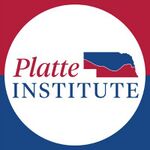Platte Institute
| Platte Institute | |
 | |
| Basic facts | |
| Location: | Omaha, Nebraska |
| Type: | 501(c)(3) |
| Top official: | Jim Vokal, Chief Executive Officer |
| Founder(s): | Gail Werner-Robertson, Pete Ricketts, Mike Groene, Warren Arganbright |
| Year founded: | 2007 |
| Website: | Official website |
The Platte Institute is a 501(c)(3) nonprofit organization based in Nebraska. It is a think tank that "takes positions on public policies that impact state economic growth and upward mobility for Nebraskans, particularly state and local laws that create barriers to work, investment, market competition, and entrepreneurship. We also advocate for tax and spending policies that collect needed revenue for core government functions, provide transparency for taxpayers and policymakers, and impose the least burden possible on the state’s economy."[1]
Background
A group of Nebraskans including Gail Werner-Robertson, Pete Ricketts, Mike Groene, and Warren Arganbright joined to found the Platte Institute in 2007.[1] As of September 2025, the organization described its mission as "to advance policies that remove barriers to growth and opportunity in Nebraska."[2]
It described its vision for the state as:[2]
| “ |
The policies we enact in Nebraska have real consequences for our daily lives. Many different groups of Nebraskans are engaged in the policy process and make valuable contributions to our state. But often, government policies impose barriers that make it harder for Nebraskans to succeed. These obstacles may limit career choices, levy unfair taxes, or spend taxpayer money without transparency or public input. The cost of these barriers is much greater than dollars and cents. When Nebraska unjustly limits opportunity, it can cost our state and communities their future vitality. For Nebraska to be a place where everyone can live their Good Life, there must be a constant voice that unites Nebraskans around policies that enhance economic freedom and enable more people to build a future in our state. We envision a state where Nebraskans have the freedom and opportunity to achieve their Good Life, Nebraska’s own version of the American Dream. Our policies will remove barriers so that:
|
” |
Leadership
As of September 2025, the following individuals held leadership positions at the Platte Institute:[2]
- Jim Vokal, chief executive officer
- Jim Smith, chief strategy officer
- Ryan Kopsa, communications and marketing director
As of September 2025, the following individuals sat on the Platte Institute's board of directors:[2]
- Pat Keenan, chairman
- Jon Abegglen
- Kyle Arganbright
- Sid Dinsdale
- Mark Geist
- Cyntha Hardin Milligan
- Jack Henry
- Dennis Hirschbrunner
- Blake Hoogeveen
- Jim Jenkins
- Aaron Otten
- Owen Palm
- Lori Scott
- Liisa Stark
- Stephen Sunderman
- Nick Ward
Work and activities
Legislative and policy work
The Platte Institute produces analyses of government policy in three primary areas:
- Government Spending
- Regulatory Reform
- Tax Policy
The group also conducts polls, produces in-depth studies of specific policies, and records a series of podcasts.[4]
Notable endorsements
This section displays endorsements this organization made in elections within Ballotpedia's coverage scope. Know of one we missed? Click here to let us know.
Finances
The following is a breakdown of the Platte Institute's revenues and expenses from 2007 to 2024. The information comes from ProPublica.
| Year | Revenue | Expenses |
|---|---|---|
| 2007 | $0.1 million | $0.03 million |
| 2008 | $0.5 million | $0.6 million |
| 2009 | $0.4 million | $0.4 million |
| 2010 | $0.6 million | $0.5 million |
| 2011 | $0.4 million | $0.4 million |
| 2012 | $0.4 million | $0.5 million |
| 2013 | $0.6 million | $0.6 million |
| 2014 | $0.7 million | $0.6 million |
| 2015 | $0.7 million | $0.7 million |
| 2016 | $0.8 million | $0.8 million |
| 2017 | $0.8 million | $0.8 million |
| 2018 | $1.0 million | $1.0 million |
| 2019 | $1.0 million | $1.0 million |
| 2020 | $0.9 million | $0.8 million |
| 2021 | $1.1 million | $1.0 million |
| 2022 | $1.2 million | $1.2 million |
| 2023 | $1.2 million | $1.2 million |
| 2024 | $1.2 million | $1.1 million |
See also
External links
Footnotes
- ↑ 1.0 1.1 Platte Institute, "Frequently Asked Questions," accessed September 12, 2025
- ↑ 2.0 2.1 2.2 2.3 Platte Institute, "About," accessed September 12, 2025
- ↑ Note: This text is quoted verbatim from the original source. Any inconsistencies are attributable to the original source.
- ↑ Platte Institute, "Home page," accessed September 12, 2025
| |||||||


